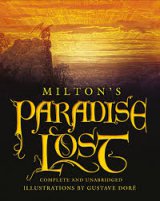Paradise Lost Page #10
Paradise Lost is an epic poem in blank verse by the 17th-century English poet John Milton. The first version, published in 1667, consisted of ten books with over ten thousand lines of verse. A second edition followed in 1674, arranged into twelve books with minor revisions throughout and a note on the versification.
Whence and what art thou, execrable shape, That dar’st, though grim and terrible, advance Thy miscreated Front athwart my way To yonder Gates? through them I mean to pass, That be assur’d, without leave askt of thee: Retire, or taste thy folly, and learn by proof, Hell-born, not to contend with Spirits of Heav’n. To whom the Goblin full of wrauth reply’d, Art thou that Traitor Angel, art thou hee, Who first broke peace in Heav’n and Faith, till then Unbrok’n, and in proud rebellious Arms Drew after him the third part of Heav’ns Sons Conjur’d against the highest, for which both Thou And they outcast from God, are here condemn’d To waste Eternal daies in woe and pain? And reck’n’st thou thy self with Spirits of Heav’n, Hell-doomd, and breath’st defiance here and scorn, Where I reign King, and to enrage thee more, Thy King and Lord? Back to thy punishment, False fugitive, and to thy speed add wings, Least with a whip of Scorpions I pursue Thy lingring, or with one stroke of this Dart Strange horror seise thee, and pangs unfelt before. So spake the grieslie terrour, and in shape, So speaking and so threatning, grew ten fold More dreadful and deform: on th’ other side Incenc’t with indignation Satan stood Unterrifi’d, and like a Comet burn’d, That fires the length of Ophiucus huge In th’ Artick Sky, and from his horrid hair Shakes Pestilence and Warr. Each at the Head Level’d his deadly aime; thir fatall hands No second stroke intend, and such a frown Each cast at th’ other, as when two black Clouds With Heav’ns Artillery fraught, come rattling on Over the Caspian, then stand front to front Hov’ring a space, till Winds the signal blow To joyn thir dark Encounter in mid air: So frownd the mighty Combatants, that Hell Grew darker at thir frown, so matcht they stood; For never but once more was either like To meet so great a foe: and now great deeds Had been achiev’d, whereof all Hell had rung, Had not the Snakie Sorceress that sat Fast by Hell Gate, and kept the fatal Key, Ris’n, and with hideous outcry rush’d between. O Father, what intends thy hand, she cry’d, Against thy only Son? What fury O Son, Possesses thee to bend that mortal Dart Against thy Fathers head? and know’st for whom; For him who sits above and laughs the while At thee ordain’d his drudge, to execute What e’re his wrath, which he calls Justice, bids, His wrath which one day will destroy ye both. She spake, and at her words the hellish Pest Forbore, then these to her Satan return’d: So strange thy outcry, and thy words so strange Thou interposest, that my sudden hand Prevented spares to tell thee yet by deeds What it intends; till first I know of thee, What thing thou art, thus double-form’d, and why In this infernal Vaile first met thou call’st Me Father, and that Fantasm call’st my Son? I know thee not, nor ever saw till now Sight more detestable then him and thee. T’ whom thus the Portress of Hell Gate reply’d; Hast thou forgot me then, and do I seem Now in thine eye so foul, once deemd so fair In Heav’n, when at th’ Assembly, and in sight Of all the Seraphim with thee combin’d In bold conspiracy against Heav’ns King, All on a sudden miserable pain Surpris’d thee, dim thine eyes, and dizzie swumm In darkness, while thy head flames thick and fast Threw forth, till on the left side op’ning wide, Likest to thee in shape and count’nance bright, Then shining heav’nly fair, a Goddess arm’d Out of thy head I sprung: amazement seis’d All th’ Host of Heav’n; back they recoild affraid At first, and call’d me Sin, and for a Sign Portentous held me; but familiar grown, I pleas’d, and with attractive graces won The most averse, thee chiefly, who full oft Thy self in me thy perfect image viewing Becam’st enamour’d, and such joy thou took’st With me in secret, that my womb conceiv’d A growing burden. Mean while Warr arose, And fields were fought in Heav’n; wherein remaind (For what could else) to our Almighty Foe Cleer Victory, to our part loss and rout Through all the Empyrean: down they fell Driv’n headlong from the Pitch of Heaven, down Into this Deep, and in the general fall I also; at which time this powerful Key Into my hand was giv’n, with charge to keep These Gates for ever shut, which none can pass Without my op’ning. Pensive here I sat Alone, but long I sat not, till my womb Pregnant by thee, and now excessive grown Prodigious motion felt and rueful throes. At last this odious offspring whom thou seest Thine own begotten, breaking violent way Tore through my entrails, that with fear and pain Distorted, all my nether shape thus grew Transform’d: but he my inbred enemie Forth issu’d, brandishing his fatal Dart Made to destroy: I fled, and cry’d out Death; Hell trembl’d at the hideous Name, and sigh’d From all her Caves, and back resounded Death. I fled, but he pursu’d (though more, it seems, Inflam’d with lust then rage) and swifter far, Me overtook his mother all dismaid, And in embraces forcible and foule Ingendring with me, of that rape begot These yelling Monsters that with ceasless cry Surround me, as thou sawst, hourly conceiv’d And hourly born, with sorrow infinite To me, for when they list into the womb That bred them they return, and howle and gnaw My Bowels, their repast; then bursting forth Afresh with conscious terrours vex me round, That rest or intermission none I find. Before mine eyes in opposition sits Grim Death my Son and foe, who sets them on, And me his Parent would full soon devour For want of other prey, but that he knows His end with mine involvd; and knows that I Should prove a bitter Morsel, and his bane, When ever that shall be; so Fate pronounc’d. But thou O Father, I forewarn thee, shun His deadly arrow; neither vainly hope To be invulnerable in those bright Arms, Though temper’d heav’nly, for that mortal dint, Save he who reigns above, none can resist. She finish’d, and the suttle Fiend his lore Soon learnd, now milder, and thus answerd smooth. Dear Daughter, since thou claim’st me for thy Sire, And my fair Son here showst me, the dear pledge Of dalliance had with thee in Heav’n, and joys Then sweet, now sad to mention, through dire change Befalln us unforeseen, unthought of, know I come no enemie, but to set free From out this dark and dismal house of pain, Both him and thee, and all the heav’nly Host Of Spirits that in our just pretenses arm’d Fell with us from on high: from them I go This uncouth errand sole, and one for all My self expose, with lonely steps to tread Th’ unfounded deep, & through the void immense To search with wandring quest a place foretold Should be, and, by concurring signs, ere now Created vast and round, a place of bliss In the Pourlieues of Heav’n, and therein plac’t A race of upstart Creatures, to supply Perhaps our vacant room, though more remov’d, Least Heav’n surcharg’d with potent multitude Might hap to move new broiles: Be this or aught Then this more secret now design’d, I haste To know, and this once known, shall soon return, And bring ye to the place where Thou and Death Shall dwell at ease, and up and down unseen Wing silently the buxom Air, imbalm’d With odours; there ye shall be fed and fill’d Immeasurably, all things shall be your prey. He ceas’d, for both seemd highly pleasd, and Death Grinnd horrible a gastly smile, to hear His famine should be fill’d, and blest his mawe Destin’d to that good hour: no less rejoyc’d His mother bad, and thus bespake her Sire.
Translation
Translate and read this book in other languages:
Select another language:
- - Select -
- 简体中文 (Chinese - Simplified)
- 繁體中文 (Chinese - Traditional)
- Español (Spanish)
- Esperanto (Esperanto)
- 日本語 (Japanese)
- Português (Portuguese)
- Deutsch (German)
- العربية (Arabic)
- Français (French)
- Русский (Russian)
- ಕನ್ನಡ (Kannada)
- 한국어 (Korean)
- עברית (Hebrew)
- Gaeilge (Irish)
- Українська (Ukrainian)
- اردو (Urdu)
- Magyar (Hungarian)
- मानक हिन्दी (Hindi)
- Indonesia (Indonesian)
- Italiano (Italian)
- தமிழ் (Tamil)
- Türkçe (Turkish)
- తెలుగు (Telugu)
- ภาษาไทย (Thai)
- Tiếng Việt (Vietnamese)
- Čeština (Czech)
- Polski (Polish)
- Bahasa Indonesia (Indonesian)
- Românește (Romanian)
- Nederlands (Dutch)
- Ελληνικά (Greek)
- Latinum (Latin)
- Svenska (Swedish)
- Dansk (Danish)
- Suomi (Finnish)
- فارسی (Persian)
- ייִדיש (Yiddish)
- հայերեն (Armenian)
- Norsk (Norwegian)
- English (English)
Citation
Use the citation below to add this book to your bibliography:
Style:MLAChicagoAPA
"Paradise Lost Books." Literature.com. STANDS4 LLC, 2024. Web. 23 Nov. 2024. <https://www.literature.com/book/paradise_lost_101>.




Discuss this Paradise Lost book with the community:
Report Comment
We're doing our best to make sure our content is useful, accurate and safe.
If by any chance you spot an inappropriate comment while navigating through our website please use this form to let us know, and we'll take care of it shortly.
Attachment
You need to be logged in to favorite.
Log In